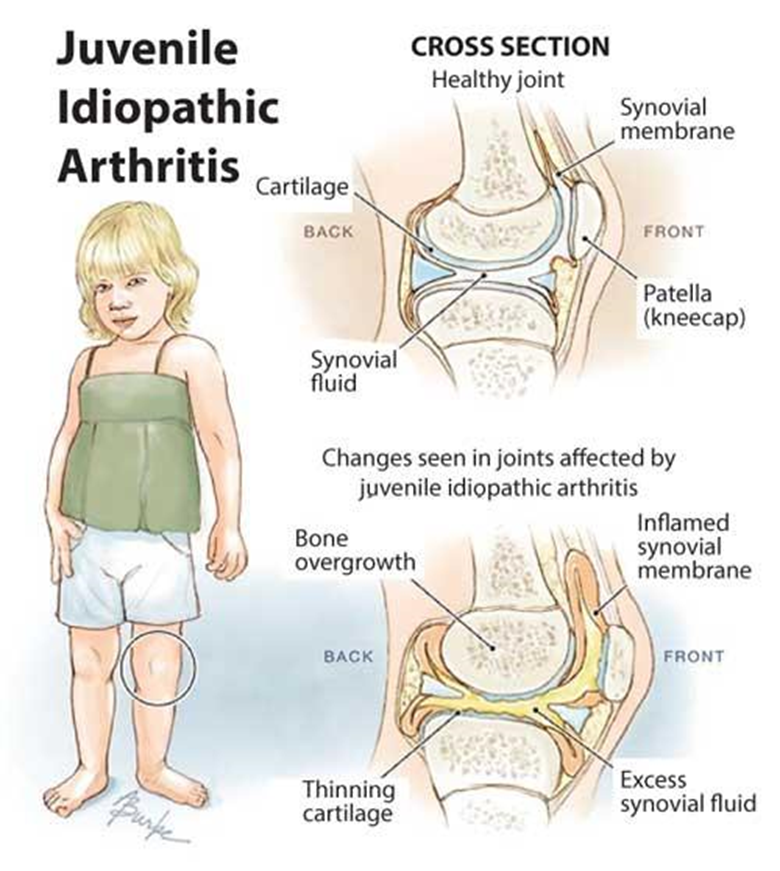A nurse is providing discharge instructions to a parent and his school-age child who has juvenile idiopathic arthritis. Which of the following
instructions should the nurse include?
Encourage the child to take a 45 min nap daily
Administer prednisone on an alternate day schedule
Apply cool compresses for 20 min every hour
Allow the child to stay at home on days when her joints are painful
The Correct Answer is B
Choice A reason: Encouraging the child to take a 45 min nap daily is not a helpful instruction, as it may interfere with the child's normal sleep pattern and school schedule. The child may benefit from regular rest periods throughout the day, but not necessarily a long nap. ⁵
Choice B reason: Administering prednisone on an alternate day schedule is a helpful instruction, as it is a common way of prescribing corticosteroids for children with juvenile idiopathic arthritis. Corticosteroids are used to reduce inflammation and control symptoms, but they have many side effects, such as growth suppression, weight gain, and osteoporosis. Giving the medication every other day may reduce some of these side effects and improve compliance. ⁶

Choice C reason: Applying cool compresses for 20 min every hour is not a helpful instruction, as it may cause skin damage and discomfort. Cool compresses may be useful for acute inflammation, but not for chronic arthritis. Warm compresses or baths may be more soothing and beneficial for the child's joints. ⁷
Choice D reason: Allowing the child to stay at home on days when her joints are painful is not a helpful instruction, as it may lead to social isolation, academic difficulties, and reduced physical activity. The child should be encouraged to attend school and participate in activities as much as possible, with appropriate accommodations and modifications if needed. The child may also benefit from physical therapy, occupational therapy, and pain management strategies. ⁸
Nursing Test Bank
Naxlex Comprehensive Predictor Exams
Related Questions
Correct Answer is ["A","C","E"]
Explanation
Choice A reason: Balancing the scale to 0 prior to use is a correct action for the nurse to take. This ensures that the scale is accurate and does not include any extra weight from the scale itself or any objects on it.
Choice B reason: Using a stadiometer to measure the infant is not a correct action for the nurse to take. A stadiometer is a device that measures the height of a standing person. It is not suitable for measuring the length of an infant who cannot stand. The nurse should use a measuring board or a tape measure to measure the infant's length.
Choice C reason: Placing a disposable covering on the scale is a correct action for the nurse to take. This prevents the transmission of germs or dirt from the scale to the infant or vice versa. It also protects the scale from any urine or stool that the infant may produce during the weighing.
Choice D reason: Weighing the infant in a diaper is not a correct action for the nurse to take. A diaper can add extra weight to the infant's measurement and affect the accuracy of the result. The nurse should weigh the infant without any clothing or diaper.
Choice E reason: Measuring the infant from crown of the head to the heels of feet is a correct action for the nurse to take. This is the standard method of measuring the length of an infant. The nurse should place the infant on a flat surface, align the head with the top of the measuring board or tape measure, and extend the legs fully. The nurse should then read the measurement at the bottom of the infant's feet.
Correct Answer is B
Explanation
Choice A reason: Leukemia is not a probable condition, as it is a cancer of the white blood cells that causes abnormal proliferation and accumulation of immature or dysfunctional white blood cells. The child has a high WBC count, which can indicate leukemia, but not necessarily. The child does not have other signs of leukemia, such as bleeding, bruising, bone pain, or lymphadenopathy.
Choice B reason: Sickle cell anemia is a possible condition, as it is an inherited disorder that affects the shape and function of the red blood cells, causing them to become sickle-shaped and rigid. The child has a low Hgb and Hct, which can indicate anemia, and a fever, tachycardia, and low oxygen saturation, which can indicate a sickle cell crisis. A sickle cell crisis is a condition where the sickle-shaped red blood cells block the blood flow and cause tissue ischemia and inflammation.
Choice C reason: Hemophilia is not a likely condition, as it is an inherited disorder that affects the clotting factors, causing impaired blood clotting and increased risk of bleeding. The child has a low Hgb and Hct, which can indicate anemia, but not necessarily hemophilia. The child does not have other signs of hemophilia, such as bleeding, bruising, hemarthrosis, or hematuria.
Choice D reason: Iron deficiency anemia is not a definite condition, as it is a type of anemia that occurs when the body does not have enough iron to produce hemoglobin, the protein that carries oxygen in the blood. The child has a low Hgb and Hct, which can indicate iron deficiency anemia, but not necessarily. The child does not have other signs of iron deficiency anemia, such as pallor, fatigue, weakness, or pica.
Whether you are a student looking to ace your exams or a practicing nurse seeking to enhance your expertise , our nursing education contents will empower you with the confidence and competence to make a difference in the lives of patients and become a respected leader in the healthcare field.
Visit Naxlex, invest in your future and unlock endless possibilities with our unparalleled nursing education contents today
Report Wrong Answer on the Current Question
Do you disagree with the answer? If yes, what is your expected answer? Explain.
Kindly be descriptive with the issue you are facing.
